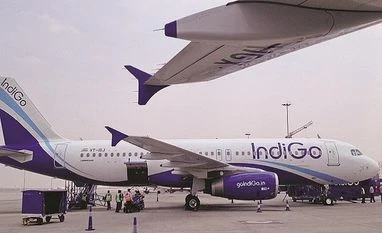A predicted strong revival in air passenger traffic, better cost management, route expansion, and fuel price cooling off may support InterGlobe Aviation's profitability in the medium to long term, analysts said.
They believe the company, which operates IndiGo airline, may potentially see a turnaround in fiscal year 2022-23 (FY23) if it continues to see better yield management, steady air fares, and maintains market leadership.
"We believe that the improving affordability, and pent-up demand of the last two years would emerge as a strong travel demand for next one year, and we expect a spike in air travel in the second half of the current fiscal (H2FY23). IndiGo, being the market leader, would enjoy this benefit, which in turn shall result in a turnaround in FY23 itself," said Mitul Shah, head of research at Reliance Securities, in a co-authored note with Sheryl Fernandes.
The brokerage has increased its revenue estimates by 22 per cent and 11 per cent for FY23 and FY24. It also raised its Ebitdar (earnings before interest, tax, depreciation, amortization, and rent), and net profit estimates by 23 per cent/7 per cent, and 216 per cent/18 per cent for FY23/FY24, respectively.
IndiGo's revenue increased by 328 per cent year-on-year (YoY), and 60 per cent quarter-on-quarter (QoQ) to Rs 12,860 crore in June quarter of FY23 (Q1FY23), driven by increased capacity (up 145 per cent YoY) due to easing of flight capacity restrictions and resumption of international travel.
Passenger yield came in at Rs 5.24 (up 50 per cent YoY and 19 per cent QoQ). Cost of available seat kilometre (CASK) for the quarter stood at Rs 5.08 (down 9 per cent YoY but up 6 per cent QoQ), while revenue per available seat kilometre (RASK) stood at Rs 4.69 (up 72 per cent YoY and 18 per cent QoQ). Passenger Load Factor (PLF) increased to 79.6 per cent.
"Yields surge was led by pent-up demand, especially in the international market. We anticipate yields to remain subdued in the near-term on seasonally weak second quarter. However, they should remain strong in the long-run. Replacement of existing current engine option (CEO) with new engine option (NEO) by end of calendar year 2022 shall enhance yields further and decrease costs," said Jal Irani and Iqbal Khan, of Edelweiss Securities, in a note.
They added that while fleet addition in the near-term would be muted, it should rise sharply by 2024. IndiGo would be in a strong position to compete internationally with the addition of 40–45 extra long range (XLR) flights by 2027. The brokerage hiked FY23 and FY24 Ebitda estimates by 4 per cent and 5 per cent, with higher target of Rs 2,446.
Motilal Oswal Financial Services expected the international market to grow faster than the domestic market, touching 40 per cent of IndiGo's total share over the next five years.
Analysts said that given the airline’s versatile fleet and coverage, IndiGo has a lot of options to operate several routes in the domestic market.
That said, analysts cautioned against increased competition, along with macro-economy related uncertainties.
"The resurgence of Air India, SpiceJet, and Jet Airways, along with new player Akasa Air, will reduce IndiGo’s market share going forward. We have lowered our target price to Rs 2,006, and maintain Neutral rating owing to limited upside from current levels," MOFSL said.
Despite strong tourist demand, corporate travel, network expansions and yield improvement, IndiGo's performance was impacted in Q1FY23 as higher fuel costs, and forex losses dragged down margins.
Thus, Elara Securities has reduced FY23 Ebitda by 17 per cent, and FY24 Ebitda by 4 per cent. "We assume FY24 ASKM capacity at 132 billion km from estimated 110 billion km in FY23. We reiterate Buy with a lower target of Rs 2,415,” it said.
Shares of the airline fell 2.8 per cent in the intra-day trade on Thursday, but erased losses to end 0.24 per cent up at Rs 1,980 on the BSE. In comparison, the BSE Sensex ended 0.09 per cent lower.
Unlock 30+ premium stories daily hand-picked by our editors, across devices on browser and app.
Pick your 5 favourite companies, get a daily email with all news updates on them.
Full access to our intuitive epaper - clip, save, share articles from any device; newspaper archives from 2006.
Preferential invites to Business Standard events.
Curated newsletters on markets, personal finance, policy & politics, start-ups, technology, and more.
)